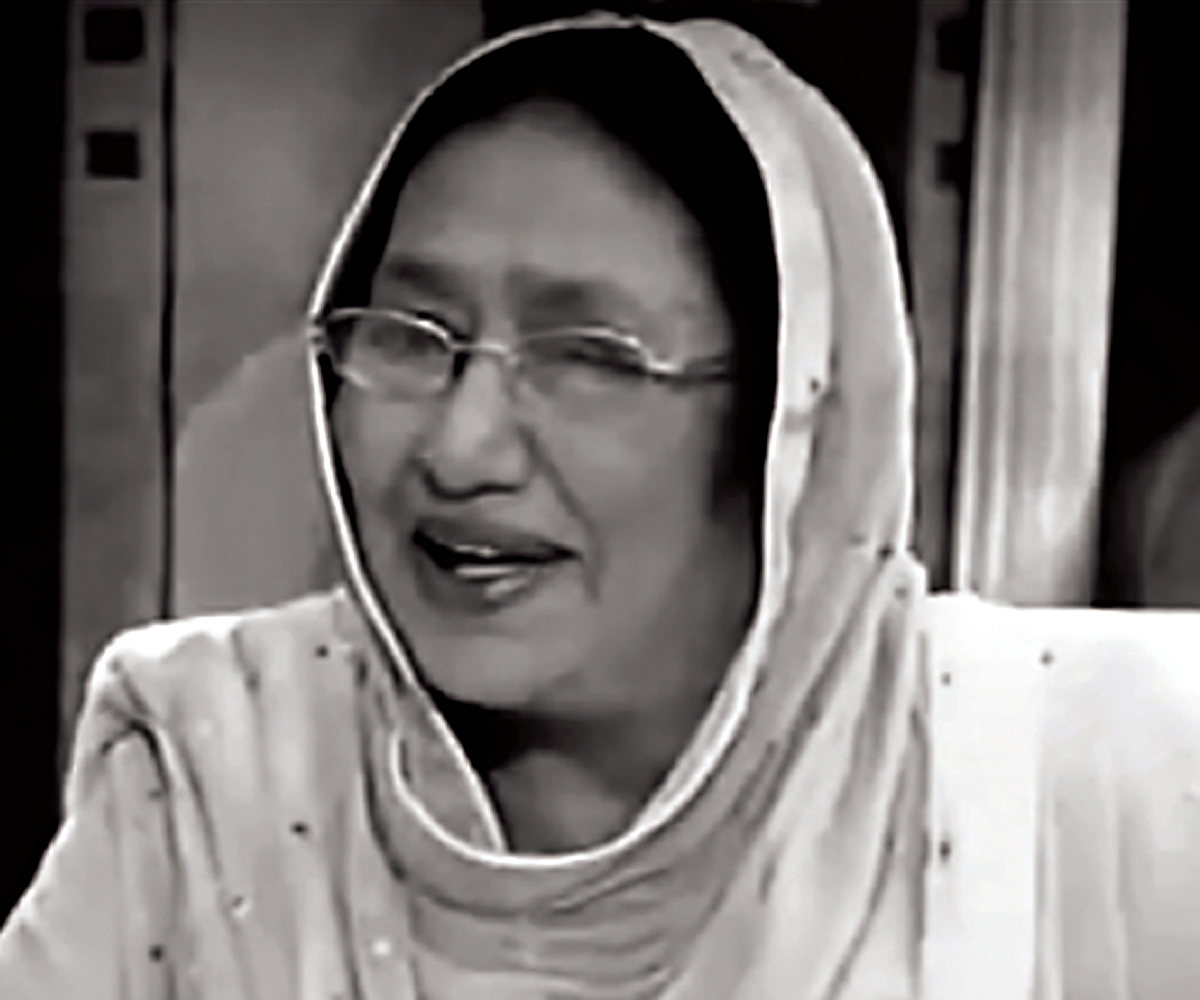
Legendary playback singer Zubaida Khanum left us with a treasure chest full of unforgettable songs to cherish for eternity, as she said a final goodbye to her fans on Saturday. Known for her songs in Urdu and Punjabi films, Khanum passed away in Lahore following a cardiac arrest. Her devoted fans in Pakistan and on the other side of the border, will always keep her alive in their memories.
“Those [Indian] journalists fell to her feet and pleaded. They said they would do anything to have her come to India and perform,” recalls her son and cinematographer-director Faisal Bukhari about the delegation of journalists from India, who came to visit Pakistan two years ago. Khanum, for them, was the voice of Punjab and one of the most talented singers in the nascent film industry in the ’50s.
While her career in music was short and prolific — spanning over 200 songs and almost 150 films — Khanum managed to engrave her name in the industry and her work will be remembered for generations to come. “She was known for the expressions she brought to her songs — the melody and feelings. This is something that many singers today can learn from her,” says Bukhari. She fell in love and got married to famed cinematographer Riaz Bukhari in 1959, after which, she completely withdrew from the industry. Her demise was on the same day as her husband’s second death anniversary.
Khanum was a natural. The star was not professionally trained or associated with any musical gharana, but with her debut in 1951 film Billo, she quickly established herself as a leading voice in the industry. “She never really had to struggle because her very first song was a hit,” states Faisal. She worked closely with music composers such as Rasheed Attray, Safdar Hussain, Ghulam Ahmed Chishti and others.
The legend was associated with Punjabi films including Heer (1955), Mahi Munda (1956), Chann Mahi (1956), Yakkay Wali (1957) and Kartar Singh (1959) and Urdu films including Anokhi (1956), Sarfarosh (1956), Ishq-e-Laila (1957) and Saat Lakh (1957). Saat Lakh played a major role in actor Neelo’s life as she shot to fame because of the song Aye Mausam, which was sung by Khanum. Yakkay Wali, on the other hand, was such a hit that earnings from the movie allowed its producer Bari Malik to buy what would become the largest studio in Pakistan (Bari Studios).
“Any song she would sing would intoxicate you and take you into a different world,” says veteran singer Abdullah Chilli. Khanum had also acted alongside Noor Jehan in Patay Khan (1955), where both played the female lead characters. “It was believed that she and Noor Jehan were the originals who defined the vocal culture in the industry. And I think what stands out [about her] is the fact that she was a natural,” Chilli adds.
After she quit the industry, Khanum became a naat-khwan and spiritual singer, who would perform at milaads and other events.
Published in The Express Tribune, October 24th, 2013.
Like Life & Style on Facebook, follow @ETLifeandStyle on Twitter for the latest in fashion, gossip and entertainment.
COMMENTS (5)
Comments are moderated and generally will be posted if they are on-topic and not abusive.
For more information, please see our Comments FAQ

1722586547-0/Untitled-design-(73)1722586547-0-165x106.webp)


1732326457-0/prime-(1)1732326457-0-165x106.webp)












The Pakistan (ruling) society is a BLACKHOLE for any artistic talent.
Greats like Tagore and Nazrul were suppressed. Iqbal was cut to Bonsai size.
In 1971 East Pakistan (Bangladesh), hundreds of Bengali artists (singers/ dancers /writers/ painters/ sculpturists etc) were selectively murdered by Pakistan Army and killing gangs like Al-Badr, Al-Shams, Razakar. Determined Bengali civil society under Sheikh Mujib's leadership managed to escape this BLACKHOLE in 1971.
In West Pakistan, talent like Zubaida ended into an occasional naat-singer.
Since 1980's the BLACKHOLE grow bigger and stronger each year as remaining Pakistan enter the next 'jihadi' phase. Pakistan's minority civil society - though weak - should fight against this 'deadly end' journey.
She was a great singer of those golden days of Pakistan. She is an unforgettable figure of our film industry.May her soul rest in eternal peace.
Zubaida Khanam will live forever. wherever punjabi is spoken, she still rules. But I am sorry to say that she was not recognized much as she deserved. May her soul rest in peace.
Zubaida Khanum Sahiba Is The Heart Piercing Voice Of Our Punjabi Soul. Her Cultural Contribution Is Everlasting.
Zubaida Khanam had a God gifted voice.
The most unfortunate part of her life was that when she got married, she was asked not to sing the songs any more.
Late Zubaida was an old time girl who sacrificed and preferred to be with her husband to raise her family.
There is no law in Pakistan which can protect the rights of female artists, more particularly once they got married.
Had Zubaida Khanam would have been today's girl, she would have taken Khula long time back from her husband (which more or less most of the girls are doing whether they are an artist or not) as the girls don't care whether their marriage remain intact or broken.
If a female artist is sincere and loyal towards her husband and children, I think that she should not be forced and push back too much in the corner to abandon her inner artist and forced to forget her talent.
God has taken back the gift from the people of Pakistan with the departure of Zubaida Khanam from this cruel world.